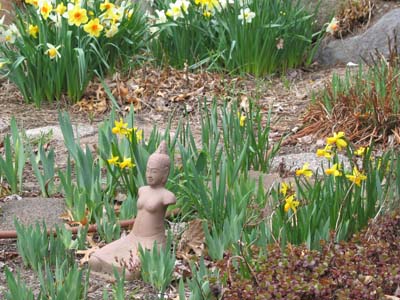Lughnasa Waxing Artemis Moon
Still feeling a bit punk, but I can breathe and I did get outside, pulled some weeds. Much better.
As August hits mid-point, we’re still experiencing high dewpoints and temperature, at least for us. Local meteorologist Paul Douglas compared today’s weather to the Congo. Land of 10,000 weather extremes.
Huh. Just occurred to me, the land of 10,000 lakes. When the Chinese say the 10,000 things, they mean the whole universe. 10,000 is a favorite number among Chinese writers and thinkers; as I interpret it, it means more than you can imagine. My understanding of the reason for selecting 10,000 in our state slogan is that it “sounds like more than 16,000,” the rough count of Minnesota’s lake sized water bodies. Whoever made the decision was right.
With the completion of the state’s first ever August 10th primary we stand now on the precipice of another silly season, campaign ads clogging the air waves, phone calls to support him or her and mailers in the box. Kate and I, because we both have the appellation Dr. in certain places, often receive mailings to gauge the feelings of Republicans like us in our district. I vacillate between pitching them and sending in disinformation.
In some ways the electoral process is politics at its purest, retail politics in which candidates use whatever means they can afford to convince individual voters to fill in the oval for them in November. In another way the electoral process is politics at its most foul as candidate use whatever means they can afford to distance themselves from their opponents: attack ads, push polling, deceptive mailings, outright lies and, the worst of all, in my opinion, pandering.
Let me give you an example of pandering. Tim Pawlenty entered Minnesota politics as a centrist right Republican. As he attempts to position himself for a Presidential bid (Yike!), he keeps edging closer to nutty right wing tricorn wearing Tea-Hee Party folks.
“Gov. Tim Pawlenty has rejected a yearslong effort to update Minnesota’s rules for lakeshore development.
Pawlenty says the revisions overreach, and undermine local control and property rights. The St. Paul Pioneer Press reported Friday that he has sent regulators back to the drawing board.” Fox News (sic) Website.
Quick now. Who builds oversized lakehomes right up to the edge? Right, your neighbor on Social Security and all those folks recently tossed off GAMC? Not hardly. Folks who receive $40,000,000 severance packages like the naughty CEO of HP, that’s who.

 serious, important matters. Stop your pursuit of a mediocre gift. The tendency to judge our worth by the accumulation of things–a he who dies with the best toys wins mentality–presses us to pursue money or status, power, with all of our gifts. You may be lucky enough, as Kate is, to use your gifts in a pursuit that also makes decent money; on the other hand if your work life and your heart life don’t match up, you risk spending your valuable work time and energy in pursuit of a mediocre gift, hiding the sublime one from view.
serious, important matters. Stop your pursuit of a mediocre gift. The tendency to judge our worth by the accumulation of things–a he who dies with the best toys wins mentality–presses us to pursue money or status, power, with all of our gifts. You may be lucky enough, as Kate is, to use your gifts in a pursuit that also makes decent money; on the other hand if your work life and your heart life don’t match up, you risk spending your valuable work time and energy in pursuit of a mediocre gift, hiding the sublime one from view.